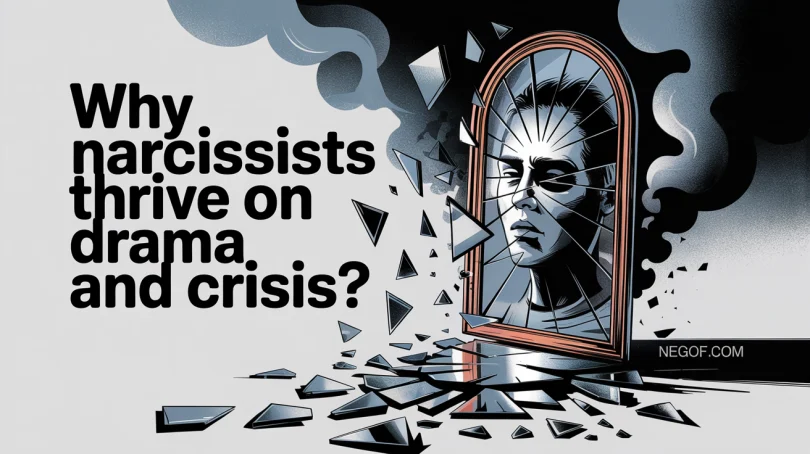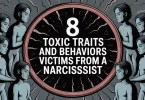Today we are going to talk about the drama, chaos and crisis that usually follows narcissistic people. While it’s safe to say that not all narcissists act the same, there are multiple shared psychological motivations for why narcissists are often attracted to drama, chaos, and why they create it. In this post, I will analyze some of those drivers with examples, to show how it happens.
The Need for Attention
Narcissistic people tend to thrive on being the center of attention, whether that’s through positive or negative means. They often crave excitement and emotional intensity. One way they achieve this is by creating dramas, crises, emergencies, or mysteries that require others to figure things out, rescue them, or take some kind of action. At its core, drama breaks the monotony of their ordinary lives, making them feel interesting, special, and important. It also allows them to feel in control.
Example: The Mysterious Messages
For instance, at a low level, a narcissist might pretend to lose their keys, prompting everyone to search for them. A real-life example comes from a workplace I was at many years ago. Shortly after getting a new phone, one staff member claimed she was receiving mysterious messages from an unknown number. The messages weren’t threatening or sinister but were odd and cryptic. She seemed caught up in the mystery of who this person was and why they were messaging her, showing the messages to other staff members and encouraging them to guess their origin and meaning.
Related Topcs:
8 Signs You’re in a Narcissistic Relationship
7 Ways to Torture A Narcissist
Seven Secret Signals of Your Subconscious: How to Understand Important Messages
After a day or two of intrigue, another staff member pointed out that the number sending the messages looked like her old phone number. It appeared she had been sending herself messages to create a mystery and draw others into solving it. While this sounds silly and childlike, the aim seemed to be to appear interesting and engage others in doing work for her by deciphering the messages. By Friday, the messages mysteriously stopped, and the topic was never mentioned again. Either her plan failed because no one was truly interested, or she grew bored and moved on to another drama.
Ego Boost Through Drama
A little bit of drama can provide a narcissist with an ego boost. By stirring up or participating in drama, a narcissistic person can manipulate others into offering sympathy or validating their perspective. For example, if something terrible happens to someone else, a narcissist might shift the focus onto themselves by exaggerating how badly the event has affected them personally. They can also exploit contention and conflict to showcase their superior intellect, morality, or even their victimhood.
Divide and Conquer
Conflict can also serve as a tool to divide and conquer others. Narcissists may exaggerate or intentionally create conflict to pit people against one another, isolate individuals, or punish those they dislike. This enhances their sense of power and control over social dynamics, often hidden behind fake compassion, empathy, or exaggerated outrage. You see this behavior frequently in narcissistic families, workplaces, communities, and especially on social media, where narcissists may eagerly take offense on behalf of others.
Drama as a Tool for Control
Another reason narcissists create drama is to exert control. At a low level, this might look like someone receiving constant text messages or phone calls from a narcissistic partner or friend while out with others. These messages might concern trivial matters that the narcissist is more than capable of handling, such as asking where they left their phone charger or how to turn on the kettle. Taking it up a notch, they might start an argument before their partner leaves to go out and continue it via text while the partner is with friends.
Sabotaging Others’ Enjoyment
Regardless of the nature of the crisis, it often involves displaying helplessness or creating tension to prevent someone from enjoying their time with others. The person receiving the messages may feel compelled to resolve the issue or return home, pulling them away from their friends. Narcissists generally dislike sharing the spotlight. If you’re enjoying other people’s company, it means you’re not thinking about them. Constant communication ensures you’re focused on them, feeding their need for attention.
Covert Narcissists and Manufactured Crises
You might find a lot of emergencies, dramas, and crises in relationships with covert narcissists. They often portray themselves as helpless, vulnerable, or victimized, claiming to be in desperate need of rescuing. They may tell their partners about the difficulties they face, but reject any help or support offered.
Example: Rejecting Help
For instance, a covert narcissist might say they need to be at a certain place by a specific time, but have no way of getting there. When their partner offers to drive them, they reject the offer, sometimes in favor of asking someone else. Eventually, the partner stops offering help due to constant rejection and devaluation. The covert narcissist then complains about how unsupportive their partner is. This cycle of whining, complaining, dry begging, and rejecting can drive partners to frustration.
Creating Emergencies to Play the Hero
Some narcissistic people create emergencies just so they can swoop in and save the day. For example, they might withhold important information, causing others to panic, only to suddenly “discover” something or “work it out,” miraculously resolving the issue. They become the hero, earning gratitude and admiration.
Spreading Conflict
Alternatively, narcissists might spread rumors or gossip to deliberately cause contention and conflict, then sit back and watch the chaos unfold. I would suggest this is a form of sadism, akin to making arrows and handing them to others to shoot at each other while they enjoy the show. In some cases, they create conflict between parties but then volunteer to mediate and resolve the issues they caused, earning praise for “saving the day” and bolstering their status and sense of importance.
Drama to Maintain Connection
When a relationship is ending or has ended, a narcissist may create problems, issues, or emergencies to elicit any kind of response. These crises might aim to prevent someone from leaving, bring them back, or simply keep a line of communication open. This could involve feigning helplessness to garner pity and sympathy, but it can also be more coercive and sinister.
Coercive Tactics
For example, a narcissist might threaten to harm someone or themselves, sending text messages or letters implying they’ll take drastic action unless the recipient intervenes. While I’m not saying a narcissistic person wouldn’t harm themselves or others, escalating threats is often a form of coercive control, making victims feel responsible for the narcissist’s actions.
Deflecting Accountability
Lastly, dramas and emergencies can serve as a way for narcissists to deflect from facing the consequences of their bad behavior. They might claim they can’t deal with what they’ve done or said because they’re too preoccupied with a neighbor’s cat or the terrible difficulties faced by people they’ve never met. These side shows are designed to shift focus away from their responsibility and accountability.
Summary: Why Narcissists Crave Drama
To summarize, many narcissistic people have unresolved internal conflicts and issues. They may unconsciously project their inner turmoil onto others, focusing on external problems to avoid introspection and confronting their flaws and insecurities. Dramas provide them with fuel, feeding off other people’s reactions and emotions. Their desperate need for attention is met through the chaos they create.
Narcissists also exploit others’ empathy and compassion. The issues they report may be genuine, but are often blown out of proportion or are easily manageable. They turn to others to get involved in their chaos to satisfy their need for attention, sympathy, excitement, or the sense of power they feel when rejecting support. To a narcissist, problems, even other people’s problems, bring attention. They may believe drama makes them interesting, but in reality, it often makes them exhausting to be around.







Leave a Comment